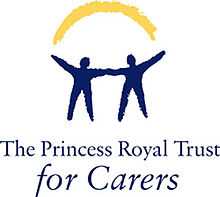The Princess Royal Trust for Carers
 The Princess Royal Trust for Carers logo | |
| Formation | 1991 |
|---|---|
| Headquarters | The Princess Royal Trust for Carers, Unit 14, Bourne Court, Southend Road, Woodford Green, Essex, IG8 8HD, England, United Kingdom |
| Website |
www |
The Princess Royal Trust for Carers was created on the initiative of Anne, Princess Royal in the UK in 1991. At that time people caring at home for family members or friends with disabilities and chronic illnesses were scarcely recognised as requiring support.
The Trust was the largest provider of comprehensive carers support services in the UK.[1] Through its unique network of 144 independently managed Carers' Centres, 85 young carers services and interactive websites, The Trust provided quality information, advice and support services to over 400,000 carers, including around 25,000 young carers.[1] In recognition of its work for the welfare and development of young people, the Trust was a member of The National Council for Voluntary Youth Services (NCVYS).[2]
In 2012, the organisation merged with Crossroads Care to form Carers Trust.[3]
Who are carers?
The UK government definition of 'carer' is: "A carer spends a significant proportion of their life providing unpaid support to family or potentially friends. This could be caring for a relative, partner or friend who is ill, frail, disabled or has mental health or substance misuse problems".[4]
A carer is someone, who, without payment, provides help and support to a partner, child, relative, friend or neighbour, who could not manage without their help. This could be due to age, physical or mental illness, addiction or disability. The term carer should not be confused with a care worker, or care assistant, who receives payment for looking after someone.
A young carer is a child or young person under the age of 18 carrying out significant caring tasks and assuming a level of responsibility for another person, which would normally be taken by an adult.
Anyone can become a carer; carers come from all walks of life, all cultures and can be of any age.
Many carers do not consider themselves to be a carer, they are just looking after their mother, son, or best friend, just getting on with it and doing what anyone else would in the same situation.
Carers don’t choose to become carers: it just happens and they have to get on with it – if they did not do it, who would and what would happen to the person they care for?
Context
The number of carers in increasing as the population ages and people with disabilities and serious illnesses live longer and are more likely to live at home.[5] Over the next three decades, the number of carers will increase by around 60% or 3.4 million carers.[6]
In addition, the country is becoming increasingly reliant on carers to deliver the new style of care for people with long term conditions, such as the home based and patient led care outlined in the Health White Paper, Our health, Our care, Our say.[7] The new policy drive for home based, individually tailored care must include a focus on carers to avoid care packages collapsing when an unpaid family carer cannot carry on. Even without the increases in quality the government wishes, the costs of care for older people will double by 2020.[8]
See also
- Anne, Princess Royal
- Caregiver
- Department of Health (United Kingdom)
- Department for Work and Pensions
- Department for Children, Schools and Families
External links
References
- Carers Centre Statistical Survey 1 April 2006 - 31 March 2007. The Princess Royal Trust for Carers. 2007.
- State of Social Care 06-06 report. CSCI. London. 2006
- It Could be You, the chances of becoming a carer, Carers UK 2001
- Securing Good Care for Older People: Taking a long-term view, Wanless, D. London: King's Fun. 2006.
- General Household Survey. 2000.
- Real change, not short change: Time to deliver for carers, Carers UK, 2007.
- National Carers Strategy Consultation; Submission from CLASP Carers Centre in Leicestershire. 2007.
- Carers Speak Out The Princess Royal Trust for Carers. London. 2002.
- Young Carers in the UK The 2004 Report, Dearden, C and Becker, S. Loughborough University Young carers research group. 2004.
- Alcohol Harm Reduction Strategy for England, Home Office. 2004.
- Women's Mental Health: Into the Mainstream. Strategic Development of Mental Health Care for Women. London: Department of Health. 2002.
- Hidden Harm, Advisory Council on Misuse of Drugs. Home Office. 2003.
Notes
- ↑ 1.0 1.1 The Princess Royal Trust for Carers (2007), Missing or empty
|title=(help) - ↑ Full list of NCVYS members
- ↑ Press release, The Princess Royal Trust for Carers and Crossroads Care merge to become Carers Trust, 1 April 2012. Accessed 22 May 2012
- ↑ Department of Health (1999), Missing or empty
|title=(help) - ↑ CSCI (2006), London Missing or empty
|title=(help) - ↑ Carers UK (2001), Missing or empty
|title=(help) - ↑ Department of Health, Missing or empty
|title=(help) - ↑ Wanless, D. (2006), London: King's Fund Missing or empty
|title=(help)